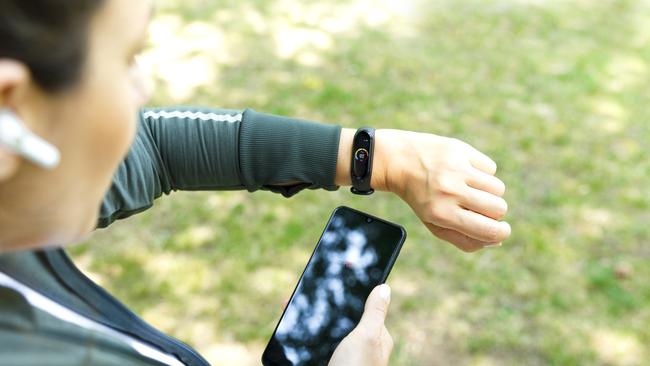Addicted to fitness gadgetry? Ditch them and find freedom
A growing number of runners, some of them at the top of their game, are ditching their GPS activity trackers and claiming to be running faster without the data overload.

They are billed as the ultimate training tool, but a growing number of runners, some of them at the top of their game, are ditching their top-of-the-range GPS activity trackers and claiming to be running faster without the data overload they provide. According to The New York Times, the devices, which often come with in-built satellite technology and sensors, heart-rate monitors and solar panels, are being replaced with basic digital stopwatches such as those that can be bought for pounds 10.99 at Argos or with nothing at all.
It’s a backlash that is not entirely unexpected. I am a self-confessed former tracking addict, once bound to my GPS watch as others might be to alcohol for a social crutch. On my daily runs I would strap on a GPS-enabled device from my extensive collection – from Garmin to Polar and Apple to Fitbit – to monitor each step and heartbeat on every incline of every trail I covered. Over time, those statistics became my sole reason for running. Where once I had enjoyed the escapism of my morning jaunt, it was now a source of stress in itself.
Three years ago, I went cold turkey. I stopped recording runs, deleted apps and muted notifications. If I wear a watch now it is only to check that I don’t lose track of time – which flies, incidentally, when my mind is occupied not by my pace, my cadence or my calories burnt but by thoughts entirely unrelated to running, random trails of thinking that set me up for the day. It’s surprising how quickly you are back at your front door when you are not obsessing about the data that will get you there. As Richard Askwith writes in his book Running Free, a bible of the technologically unburdened exerciser: “Never mind the beautiful national trail you are running on, just think of what all those miles will mean for your online profile.”

I started running in the 1980s when it was by nature a minimalist activity. It’s been a revelation to rediscover that the joy of exercising lies in its simplicity. I have friends, some of them serious runners, who gave up on their GPS tracking long before I did. For a few it was in response to “Strava-stalking” – being followed on the fitness app – but mostly it was because it no longer served a purpose. A running coach warned me a decade ago that data can be as destructive as it is useful, even for elite athletes looking to improve their performance, as it provides pressure and targets that are sometimes misleading and often irrelevant. Sports psychologists say that runners and cyclists who become overreliant on technology pay less attention to the one thing that provides the most accurate feedback about recovery needs and training requirements: their own body.
In the end I grew weary not just of the endless feedback – alerts to pick up my cadence, audio reminders of my target pace slipping away – but of the endless social aftermath. Unless you track in private (which to many defeats the object of doing it at all), you lay yourself open to public scrutiny of your achievements, however lowly they might be. I became a slave to Strava kudos, to awards for personal records, and to online high-fives from my followers. This morning I ran for about an hour and felt better for not knowing how far or fast I was moving. Activity tracking has its place for those who need motivating to meet their daily step count. If you are not one of them I can highly recommend weaning yourself off your watch.
‘I’ve written down stats for as long as i can remember’
I was there before it was a thing, I was there when it was all the rage, I’ll still be there long after the hipster herd have moved on to pastures new (Robert Crampton writes). That’s how I view the apparent decline of “tracking”, aka the recording of personal data about a variety of activities. I write down my weight, miles walked, miles cycled, weights lifted, lengths swum, hours slept, food eaten, drink drunk, fags smoked, articles published, trains taken, flights boarded, countries visited and much more besides.
I do so on paper, in my actual existing-in-time-and-space diary. I chart many of those stats too, on actual graph paper. In different coloured felt pens. I tried making the switch to electronic devices, wearing a Fitbit for a while, but it wasn’t for me, partly because I couldn’t get it to work properly, but mainly because the data felt transitory, impermanent and, worst of all, semi-public, ie vulnerable to hacking. Unlike contemporary trackers I rarely, if ever, share my stats. Indeed, I have a horror of doing so. Excuse the cliche, but I’ve only ever been about competing with myself.

I play about with averages, targets, shifts, trends. I’m a words man, but I have a fascination with numbers too, and tracking satisfies it. I like doing my own maths, which was another aspect of the Fitbit I didn’t enjoy: rather impertinently, it did the calculations for you.
Inasmuch as I have hobbies, tracking is one of them. I did this before tracking was popular – indeed, when it was considered borderline weird, even pathological – and I’ll keep doing it now that recent converts have decided it’s uncool or unhealthy or unwise. I see no reason to stop. My dad did it too, right up until the day he died. I have his last diary from 2011: July 11 is full of neatly noted figures relating to car mileage, expenditure, chores completed; July 12 is poignantly blank.
I’ve written down stats for as long as I can remember. I have diaries and notebooks, some maddeningly incomplete, going back to the 1970s, when I was a teenager. I could tell you how far I walked and cycled on this date in 1979. Oh, OK, since you ask: four and six miles, respectively, some of them uphill while carrying a heavy bag of Hull Daily Mails on my nightly paper round. For which I earned pounds 1.50 a week, six days a week.
So you’ll forgive an element of smugness if I compare myself to the early adopter of a cult band who are mega-loved for a spell and then revert to cognoscenti status once again, all the while producing good stuff. Through it all, I stick with them, I stay loyal, loving the old tunes, appreciating the new ones, treating Kipling’s two impostors just the same.
Why do I spend up to half an hour a day writing down these details? Apart from advanced narcissism, obviously? Well, I think it’s about control, partly. Or the illusion of control, at any rate, the attempt to impose some order and structure on a life lived to a high degree at the mercy of fate, luck, the decisions of others, the global forces of economics, politics, demographics and meteorology, over which I have only an infinitesimal amount of agency. War? Climate change? Massive population shift? Yeah yeah yeah but, hey, I did 16,000 steps yesterday (Tuesday), and because I write these totals down, I know that raises my annual daily average to 12,541. That’s me right there, shaping my environment.
Which brings me to targets. Targets get a bad press, thanks to some silly ones imposed on the NHS and schools and so forth, but they work for me. They’re an incentive to do more of the good stuff and less of the bad stuff. I want to see the relevant lines on my gaily coloured graphs going in the right direction. You might say you can register improvements (or relapses) anyway, without having the precise stats to hand. I’d argue that if you don’t have the hard numerical evidence, human nature tends towards self-delusion.
And lastly, having the stats is interesting for its own sake. To me, primarily. But also, one day, perhaps some anthropologist – or nutritionist, or more likely psychiatrist – might benefit from all the data I’ve accumulated. Although, fair warning, it is pretty niche.
The Times







To join the conversation, please log in. Don't have an account? Register
Join the conversation, you are commenting as Logout